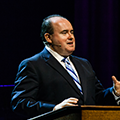This is partially a repeat of concepts presented in various other articles in this series, but these foundations cannot be overemphasized. Here is what a core group must establish and understand.
A Biblical Model of Church Leadership
If a group doesn’t understand that it is aiming at (a) a founding pastor who will then work at discipling and qualifying (b) elders and deacons, then it may find itself getting the wrong man for the job. The core group must have a decent grasp of basic ecclesiology. Systematic theologies should be utilized to train the group in the purpose, functioning, and structure of the church.
A Doctrinal Statement, Either Complete or Outlined
Some church plants simply utilize the already-established doctrinal statement of a like-minded church and make it clear, “This is what we are about.” That is a good practice with one caveat: Many church members or core group members don’t make the connection that the doctrinal statement is actually what is going to be preached, taught, and adhered to. One church-planting pastor I know was really given a bait and switch when the core group put forward a Calvinistic doctrinal statement but enough of them did not believe this such that it sabotaged his ministry from day one, causing theological debates and disunity. A core group may develop a doctrinal statement in connection with the founding pastor, or the founding pastor may bring his own doctrinal convictions. In any case, there must be a clear and established doctrinal position.
A Genuine Love and Connection Between Core Group Members
Planting a church should be thought of as a process of likely several years. This begins with the initial conception of the idea and continues all the way to formation of the church structure and the partnering with a founding pastor. This time should be used to patiently and proactively deepen relationships in the core group. They are potentially, after all, doing ministry together for decades. Their children will grow up together as the church grows up as well. Thus, fellowship, dinners, activities, prayer times, and studying together should become a lifestyle for a decent period of time even as progress is made toward officially planting the church.
Financial Planning and Parameters Should be Established
One of the most practical things a core group can do is to begin saving money as a group. The group should agree upon a small team to manage those funds for only the very basics. Primarily, the group should be saving for a salary for a founding pastor. But also, helpful things such as purchasing hymnals for home gatherings of the core group, purchasing books for study, or developing a non-published website might be reasonable uses of funds. A simple set of temporary by-laws might be adopted to guide the use of those funds in the event of the disbanding of the group.

